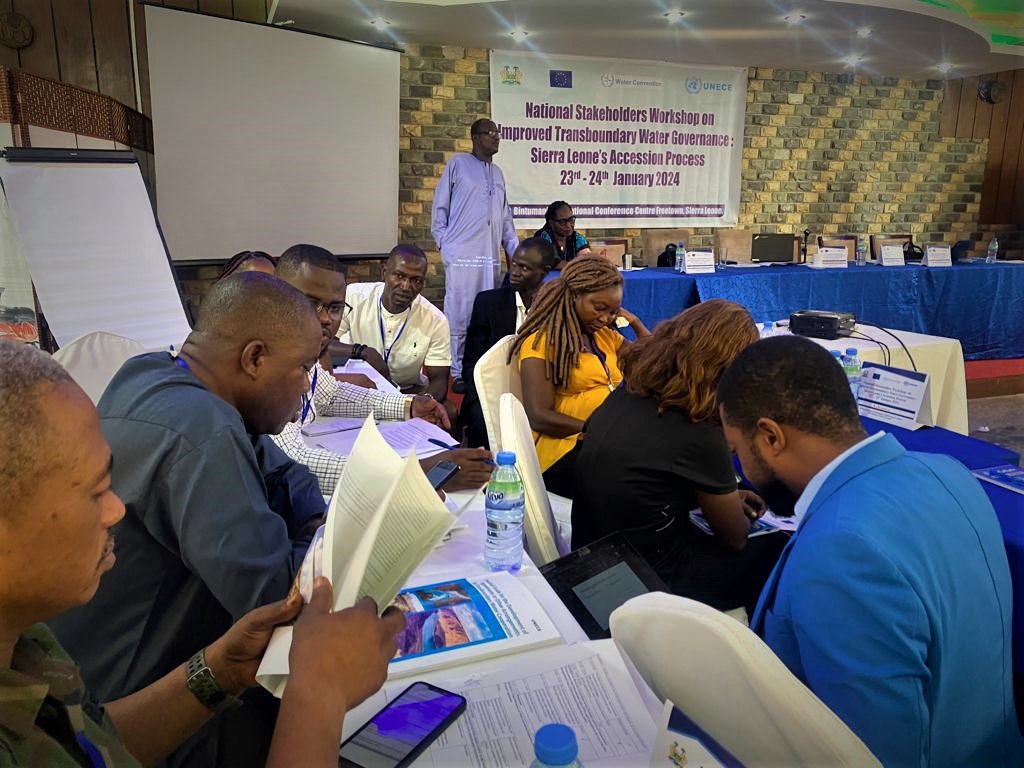The National Water Resources Management Agency (NWRMA) has concluded a two-day stakeholders consultation and capacity-building workshop in Freetown, on “Improved Transboundary Water Governance” as part of Sierra Leone’s preparation to accede to the 1992 UN Water Convention.
The workshop which drew participants from the diplomatic Corp, development partners, government partners and key stakeholder within the Water, Sanitation and Hygiene sector is meant to capacitate participants with the necessary tools required to properly articulate the issues around accession, in order to fully appreciate the provisions of the convention.
The Director-General of NWRMA, Junisa P. Bangali Esq. said against all odds, the accession process is on track, after receiving Cabinet’s approval. He said Sierra Leone’s accession to the convention will be a big win for government’s efforts in governing our transboundary water, and benefiting from their shared blessings. “We have also decided as a country, based on advice that we cannot only accede to the 1992 UN Convention on the Protection and Use of Transboundary Courses and International lakes, but also the 1997 Water Convention on the Law Non-Navigational Water Uses. It is in our interest to be part of these global instruments, if we are to sustainably manage the Country’s water Resources.” DG Bangali said.
The Secretary of the 1992 UN Water Convention, Ms. Sonja Koeppel, said Sierra Leone’s recent report on SDG 6.2.5 shows that the country is advanced in transboundary cooperation-an important progress made over the last few years, with tangible evidences like the creation of transboundary water committees, with support from Mano River Union. “but much more is needed. The Water Convention can help in this regard. The Convention is a concrete and effective global legal and intergovernmental framework and platform aimed to support cooperation and sustainable management of shared waters, including groundwaters. Accession can enable the Sierra Leone to benefit support by the community of Parties” Ms. Koeppel said.
One of the participants at the workshop, P.C. Alamin Kanneh of Koya Chiefdom, Kenema District says since local riverine communities bear the brunt of transboundary issues, it is quite necessary that effective community consultation is taken into consideration, for local perspectives to properly inform the accession process.
The United Nations Resident Coordinator in Sierra Leone, Seraphine Wakana commended the Government of Sierra Leone for its efforts in undertaking reforms to meet its international obligations and in addressing the challenges water poses to the country. “Sierra Leone has made significant strides in water resource management, and we are committed to furthering our efforts in line with international best practices. Therefore, this workshop provides us with a unique opportunity to exchange experiences, learn from one another, and explore innovative solutions to our challenges. Through such collaborative initiatives, we can build resilience, adapt to changing circumstances, and secure a sustainable future for generations to come.” Ms. Wakana said.
Giving the keynote address, the Minister of Water Resources and Sanitation, Dr. Sao-Kpato Hannah Isata Macarthy, appreciated the UN Water Secretariat for organizing the meeting, and EU delegation in Sierra Leone for supporting it. She said her Ministry understand that water is life, and that they have a huge responsibility that water is secured and sustained. “These resources need to be managed in cooperation. Hence, it is a must that that we as Mano River countries collaborate among ourselves, because whatever happens to these rivers affects all countries connected. As we deliberate on the complexities of this task, let us be mindful of the environmental, social and economic implications. We cannot deal with water in isolation.” The Minister said.
The Convention on the Protection and Use of Transboundary Watercourses and International Lakes is a unique international legal instrument and intergovernmental platform which aims to ensure the sustainable use of transboundary water resources by facilitating cooperation. Initially negotiated as a regional instrument, it was opened up for accession to all UN Member States in 2016.
Sierra Leone shares many transboundary waters: Great Scarcies River with Guinea in the North-West, and Moa/Makona River in the South of the country. Ratifying such a convention will provide Sierra Leone with the relevant tools and platform to be able to properly manage the shared opportunities these resources present.
It is expected that every participant properly understands what the UN Water Convention holds for the represented institutions, and how they make the accession process easy.
Transboundary basins cover nearly half of the earth’s surface, and accounts for more than 60% of the global freshwater flow. The convention on the protection and use of Transboundary watercourses and lakes, also known as the Water Convention was developed to promote sustainable and peaceful management of shared water resources.

